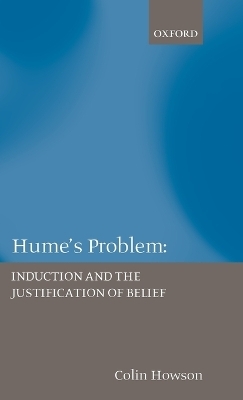
Hume's Problem
Induction and the Justification of Belief
Seiten
2000
Oxford University Press (Verlag)
978-0-19-825037-1 (ISBN)
Oxford University Press (Verlag)
978-0-19-825037-1 (ISBN)
A solution to one of the central, unsolved problems of Western philosophy, the problem of induction. David Hume argued that successful prediction tells us nothing about the truth of the predicting theory. Howson claims that Hume's argument is correct, and examines what follows about the relation between science and its empirical base.
Colin Howson offers a solution to one of the central, unsolved problems of Western philosophy, the problem of induction. In the mid-eighteenth century David Hume argued that successful prediction tells us nothing about the truth of the predicting theory. No matter how many experimental tests a hypothesis passes, nothing can be legitimately inferred about its truth or probable truth.
But physical theory routinely predicts the values of observable magnitudes to many places of decimals and within very small ranges of error. The chance of this sort of predictive success without a true theory seems so remote that the possibility should be dismissed. This suggests that Hume's argument must be wrong; but there is still no consensus on where exactly the flaw in the argument lies. Howson argues that there is no flaw, and examines the implications of this disturbing conclusion for the relation between science and its empirical base.
Colin Howson offers a solution to one of the central, unsolved problems of Western philosophy, the problem of induction. In the mid-eighteenth century David Hume argued that successful prediction tells us nothing about the truth of the predicting theory. No matter how many experimental tests a hypothesis passes, nothing can be legitimately inferred about its truth or probable truth.
But physical theory routinely predicts the values of observable magnitudes to many places of decimals and within very small ranges of error. The chance of this sort of predictive success without a true theory seems so remote that the possibility should be dismissed. This suggests that Hume's argument must be wrong; but there is still no consensus on where exactly the flaw in the argument lies. Howson argues that there is no flaw, and examines the implications of this disturbing conclusion for the relation between science and its empirical base.
Colin Howson is Professor of Philosophy at the London School of Economics.
Introduction ; 1. Hume's Argument ; 2. Reliabilism ; 3. Realism and the No-Miracles Argument ; 4. Probabilism ; 5. Deductivism ; 6. The Naturalistic Fallacy ; 7. A New Species of Logic ; 8. The Logic of Scientific Discovery ; 9. Chance and Probability ; Finale ; Coda of Miracles ; References ; Index
| Erscheint lt. Verlag | 1.1.2001 |
|---|---|
| Verlagsort | Oxford |
| Sprache | englisch |
| Maße | 145 x 224 mm |
| Gewicht | 445 g |
| Themenwelt | Geisteswissenschaften ► Philosophie ► Erkenntnistheorie / Wissenschaftstheorie |
| Geisteswissenschaften ► Philosophie ► Logik | |
| Naturwissenschaften | |
| ISBN-10 | 0-19-825037-1 / 0198250371 |
| ISBN-13 | 978-0-19-825037-1 / 9780198250371 |
| Zustand | Neuware |
| Haben Sie eine Frage zum Produkt? |
Mehr entdecken
aus dem Bereich
aus dem Bereich
die Grundlegung der modernen Philosophie
Buch | Softcover (2023)
C.H.Beck (Verlag)
18,00 €
Buch | Softcover (2023)
Reclam, Philipp (Verlag)
7,00 €


![Was heißt Denken?. Vorlesung Wintersemester 1951/52. [Was bedeutet das alles?] - Martin Heidegger](/media/113619842)